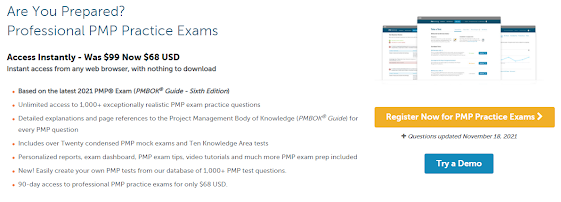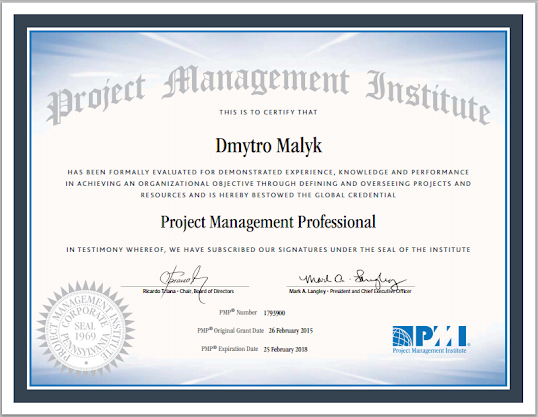I have passed my PMP exam today, and I just want to share my experience with you.
First of all, I would like to list the key tools and techniques that helped me to get ready for the exam. So these keys to my success were PMBOK 5, Rita Mulcahy, and a few online training resources. Also, the major input was my experience.
Generally speaking, it took almost a year to prepare for this certification including two months of the audit by the Project Management Institute - PMI. They randomly select people to be audited among all the applicants. I was that "lucky" guy. The audit requires the review of the applicant's claimed project management experience. Therefore, I had to describe all of my projects providing the contacts of my supervisors or clients, so that the PMI would be able to request a confirmation from them if need be.
What also really helped me, was that I made myself review the processes happening on my real projects and compare how they respond to the PMI's standards.
Apparently, I did not use 100% of all the tools, techniques, and methodologies mentioned in the PMBOK material. However, I analyzed the discrepancies and wrote them down in my preparation notebook categorizing them by the PMI processes. I understood how the selected tools and methodologies complied with the standards, and why I did not use one or another. I did not expect this, but it appeared to be an interesting game.
Rita Mulcahy. PMP Exam Prep
Next, I want to stress that I was reading this book along with the PMBOK book. A Chapter or process group from Rita's book and the corresponding material in the PMI's book. This was the only single way for me to get the PMBOK book read twice as the language is so dry and boring that I often fell asleep walking through those standards. On contrary, the PMP Exam Prep material is much more interesting and easier to understand. In fact, just this book is more than enough to get yourself ready for the PMP-exam

Click to view on Amazon
At first, I tried to follow all the recommendations from the book. That said, due to lack of time I developed my own approach. For example, I tried to read a chapter and then review it right after that. During the review, I highlighted all the concepts and terms which I felt were important for me.
After I had read the whole book, I did 2-3 chapter tests every day. My results varied from 70 to 80%. Also, review again. Sometimes I was just looking through the chapter anchoring on the highlighted items. As far as I remember, integration management, risk management, procurement management were those chapters that I reviewed more than 4-5 times.
Frankly speaking, I did not learn anything by heart except 25 Planning "processes" from Rita's chart. In order to pass the exam, you must know them in order.
Naturally, I reviewed all Rita's 72 processes every day along with the PMI process flowchart with all the inputs, outputs, tools and techniques. To the end of my study I found myself remembering all the processes; consequently, and I could easily map Rita's processes to PMBOK processes. Some PMP-certified managers say that memorizing both charts guarantees answering up to 70 questions on the exam. Although I am a bit hesitant about the specific numbers, I do confirm that my deep understanding of both charts helped me a lot.
In addition, I was using the Hot Topics book by Rita Mulcahy to prepare for the exam. This book helped me to refresh what I read in the "PMP Exam Prep" book. I used to review Hot Topics during my lunches. 50-60 pages in 30-40 minutes during 2 weeks before the exam.
Online mock exams
My first step was to get subscribed to pmtraining.com for $68 CAD for 90 days.
I passed 50% of all mock tests. Had I failed I would have used the second half. Each test consists of 50-60 questions for 1 hour. I managed to take 3-4 every day. My results differed from 60% to 95%.
 |
| PMP mock test results (click to enlarge) |
I had a rule: if I get less than 80%, I have to revise the chapters which questions I answered wrong. This online resource helped me to identify the area I had to improve. Here are some results I saved during my preparation for the exam.
One of the major bits of help was my family as well. They understood that the certification was an important key to my career in Canada and I had 2-3 hours in the evening for my study.
The day before the exam I did not learn or revise anything. I let myself have some rest and an 8-hours dream.
Exam
I will not talk about all those prerequisites like ID cards, scanning for electronic bugs or cribs etc. I will tell you about my feelings on the exam.At first, I had 15 minutes to review a sort of training "how to answer questions on the exam". I looked through all those pages in 3-4 minutes. The rest of the time was for all the formulas and processes which I drafted quickly on a given paper. Just to have all the processes ready to use for appropriate questions. Again, I thought it would help me, as many bloggers recommended this way; however, I was wrong as I didn't even look once at any written formulas or processes because they all were in my memory.
However, if you are not sure if you can memorize them, you will have enough time to write them down. I tried writing all planning processes 5-6 times at home, just as you must write fast and clear on the exam.
Manage your time. Define main ideas.
So, 200 questions in 240 minutes. After my first hour, I was almost 30 questions behind the remaining time. Obviously, I was feeling nervous a bit, but I made myself not look at my watches every minute and stay focused on questions. The planned "answering speed" was caught up at my 3rd hour only.To my feeling, at least 20-25% of questions were so wordy (2-4 paragraphs) that I had to read them 2-3 times to get to the point.
Furthermore, it was more complicated when such a wordy question was tricky having two correct answers at the first sight.
I stuck on one question related to network diagramming. 15 activities to sketch and find a critical path. Had I had an exam again I would have postponed this question to answer in the end.
Questions with several correct answers
There are 4 answers, and only one of them is correct. As a rule, two answers do not make any sense and it is easy to eliminate them if you remember terms, concepts, and theories correctly. Thus, you must figure out what is the correct one among the remaining answers. Think about what the BEST option or the most URGENT action is. The answers are very logical and if you understand project processes it would be not very difficult to find a correct variant. The exam does not have a goal to trick or fail you.Also, remember to watch for the EXCEPT, BUT, INCORRECT words in the last statement of the question. You can get confused if you miss this word.
Network diagrams
- 4-5 questions related to networks diagrams. At least in 3 of them, I had to do forward and backward paths to determine floats or updated critical paths, or apply schedule crashing.
- One question did not require to determine anything but to be read carefully.
Calculations
- Up to 5 questions you have to use a calculator to calculate CPI, SPI, EAC, CV, SV, ETC. Watch for an appropriate EAC formula in different questions. I used two of them.
- There was no question to calculate Present Value.
- 2-3 questions to determine the number of communication channels.
Final review
I marked at least 30 questions for my final review. Once I got to question #200, I had only 5 minutes left! I did change only one answer in those 30 questions, but I was not sure if I chose the correct one :)Therefore, remember that your first answer is the best answer.
This is my short story ;)






